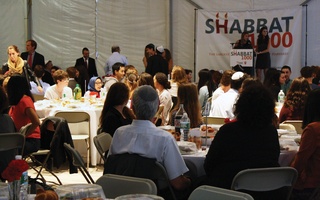Munching on gefilte fish and challah, over 600 Harvard affiliates—Jews and gentiles alike—packed Annenberg Hall last Friday night to observe the beginning of the Jewish sabbath.
Embattled University President Lawrence H. Summers delivered the opening remarks of the event, dubbed Shabbat 1000.
When his name was announced, the audience responded with vigorous applause, which surged again when Summers stepped up to speak.
“It’s a thrill to attend a warm and friendly Harvard meeting,” quipped the president, who arrived at 6:45 p.m. accompanied by his wife of two months, Professor of English and American Language and Literature Elisa New.
Summers, wearing a standard-issue black yarmulke, spoke from a small makeshift stage near the center of the hall. Yet without amplification—use of electronic appliances is forbidden during the Jewish sabbath—he was nearly inaudible to much of the maximum capacity crowd.
In his brief remarks, Summers discussed the significance of Shabbat 1000 in light of Harvard’s once-anti-Semitic admissions policies.
“It was not always so,” he said, referring to Harvard’s large Jewish community. “But now it is so, and it will always be so. This is a special moment for Harvard’s Jewish community.”
For most of the night, the hall buzzed with the chatter of curious goyim and a veritable Who’s Who of campus Jewry, including Summers, Dean of the College Benedict H. Gross ‘71, Peretz Professor of Yiddish Literature Ruth R. Wisse, Frankfurter Professor of Law Alan Dershowitz, and former Undergraduate Council President Matthew J. Glazer ’06.
“I think it’s a great use of Annenberg and I’m glad the community can get together for dinner,” Gross said, adding that he would have to leave early to attend Shabbat dinner at a family friend’s house.
Guests dined on typical Hillel fare of chicken, carrots, potatoes, and tofu, accompanied by a thimble of grape juice for the Kiddush, the Jewish blessing over wine.
By the time Hillel Rabbi Avi Poupko attempted to loosen up the crowd with breathing exercises and song around 8:15 p.m., only some were listening.
“How many of you ate gefilte fish tonight?” Zarchi asked, drawing mild applause from those who could hear, before admitting, “I’ve had better, but it’s pretty good.”
According to event co-ordinator Rebecca M. Rohr ‘08, Shabbat 1000 originated at the University of Arizona and spread to campuses around the country.
“I went to Shabbat 1000 at NYU last spring,” Rohr recalled, “and said we have to bring this to Harvard.”
Rohr, the president of Chabad at Harvard, and Hillel President Judith T. Greenberg ‘07 spearheaded the event, the first jointly sponsored by their two organizations.
They chose Annenberg because it was both sizeable and secular, according to Rohr.
“We were looking for a neutral space for people who’d always wanted to go but felt like Hillel wasn’t for them,” she said.
The event was free, and Hillel and Chabad jointly subsidized the cost of dinner for those not on Harvard’s meal plan. The dinner sold out 10 days in advance, and had a waiting list of over 100 people before the event. According to organizers, everyone who was on the waitlist and came to the dinner was admitted.
Hillel volunteer Talia Kraemer ’06 said she was elated to see such a large crowd sharing in a ritual that has special significance for her—a common refrain heard among the regular Hillel-goers at the event last night.
“It’s exciting to see people from all over Harvard,” Kraemer said. “I think the goal of tonight is to make Shabbat feel more accessible to people who don’t currently feel ownership over it and would like to.”
The number of attendees, over 600, was coincidentally just a handful fewer than the number of commandments incumbent upon Jews according to the Torah—613.
As he helped his wife leave with their restless children halfway through the event, Lecturer on Psychology Tal D. Ben-Shahar, who teaches the popular course “Positive Psychology,” said he wanted to see more frequent public Shabbats,
“We should have Shabbat at least twice a week,” Ben-Shahar said. “Shabbat literally means to rest. I think Harvard students should rest more.”
—Staff writer Sam Teller can be reached at steller@fas.harvard.edu.
CORRECTIONS:
The original story incorrectly stated that Chabad Rabbi Hirschy Zarchi attempted
to loosen up the crowd with "breathing exercises and song" at the dinner. That same story also incorrectly stated that Hillel subsidized the cost of dinner for those not on Harvard's meal plan. As the story now states, both Hillel and Chabad jointly subsidized the meals. The story also stated that the event had a waiting list of over 100 people. Although the waiting list did exist, the original story did not make it
clear that no one was turned away from the dinner. The Crimson regrets the errors.
Read more in News
Poll: Students Say Summers Should StayRecommended Articles
-
Hillel Elects New LeadersHarvard Hillel elected its third consecutive female president at last night’s elections. Judith Z. Herbstman ’07 will also be the
-
Chabad v. HillelNow hear this: There is no rivalry between Chabad House and Hillel. At least that’s the party line here at
-
Letter from Hillel Undergraduate Steering Committee President Judy Z. Herbstman '07June 6, 2006 Dear Parents and Grandparents, Harvard Hillel is facing a budget crisis that will affect the dining program
-
Blowout Crowd at Shabbat DinnerOn Friday night, hundreds of students and faculty members were lined up outside of the Malkin Athletic Center (MAC) waiting
-
 ‘Shabbat 1000’ Draws 800 To Celebrate Sabbath
‘Shabbat 1000’ Draws 800 To Celebrate Sabbath













